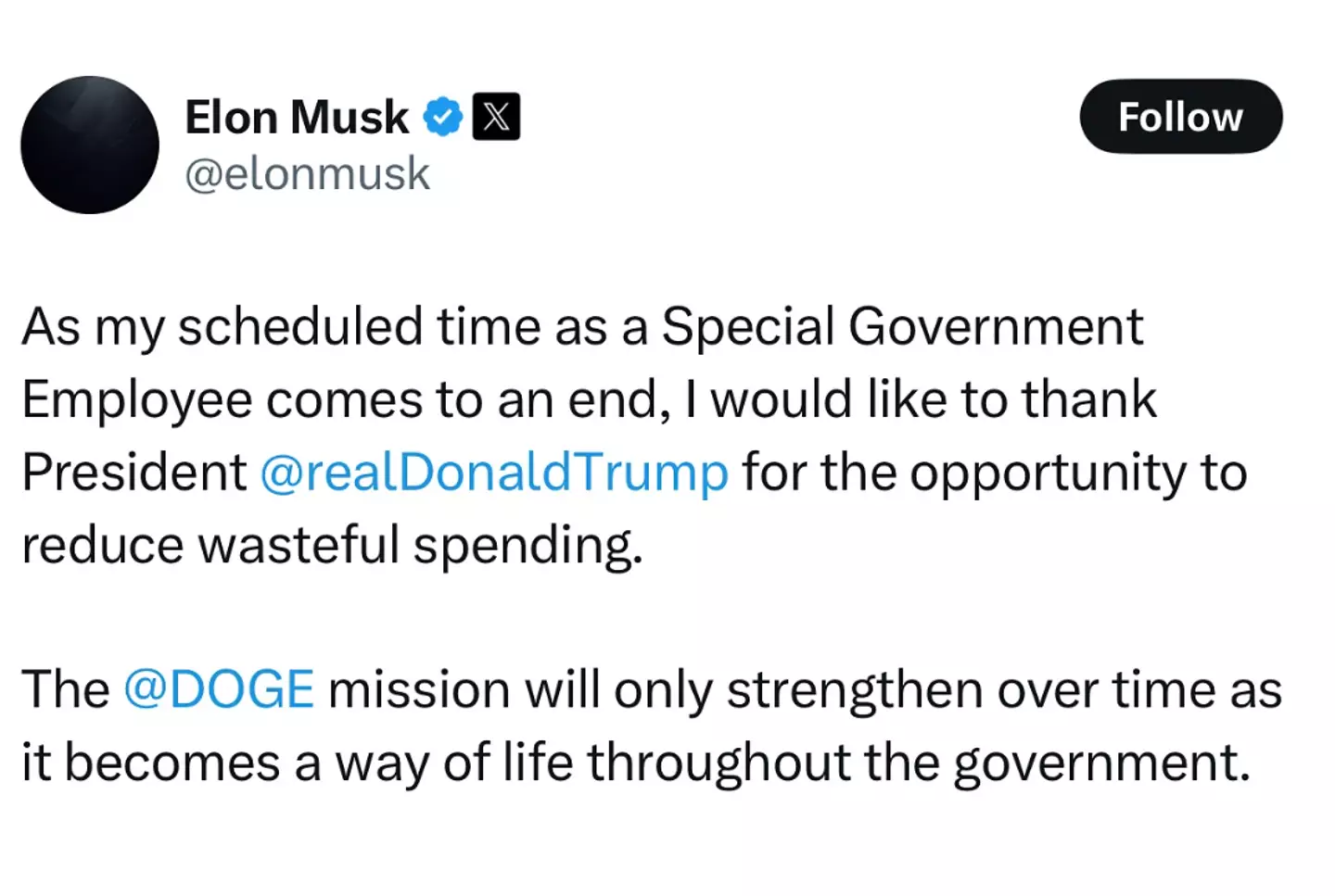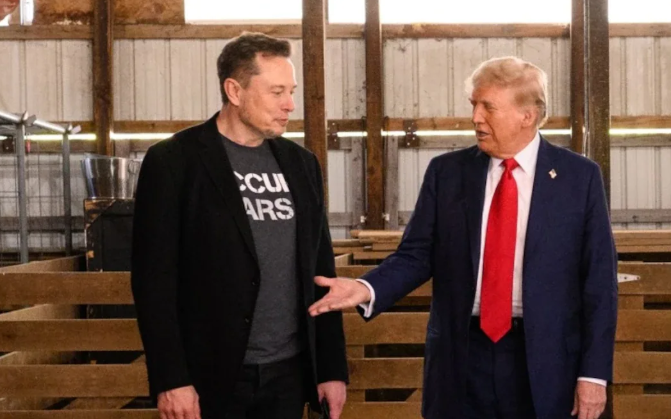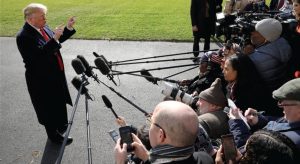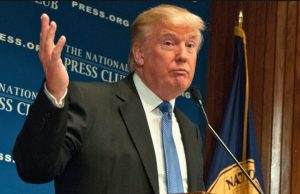In a move that has sparked waves across both political and tech communities, Elon Musk officially stepped down from his role as co-lead of the Department of Government Efficiency (DOGE), a position appointed to him by President Donald Trump earlier this year. Musk, known for his unfiltered presence on X (formerly Twitter), marked his exit with a composed, seemingly gracious message to Trump—only to follow it up with comments that revealed a more strained reality behind the scenes.
The announcement came early on the morning of May 29, when Musk tweeted, “As my scheduled time as a Special Government Employee comes to an end, I would like to thank President @realDonaldTrump for the opportunity to reduce wasteful spending. The @DOGE mission will only strengthen over time as it becomes a way of life throughout the government.”
However, this message—though professionally worded—did not tell the full story. Just minutes later, headlines broke around the globe confirming that Musk’s departure was not merely the natural end of a temporary appointment, but a dramatic and symbolic break from the Trump administration. And while Musk’s official tweet struck a cordial tone, subsequent posts and public interviews hinted at the deeper rift that had formed between the billionaire tech mogul and the 78-year-old President.
The Origins of the DOGE Appointment
Back in January, following Trump’s inauguration, Musk was named co-lead of the Department of Government Efficiency—a role intended to streamline government spending and improve operational productivity. The appointment was met with mixed reactions. Musk’s defenders praised the move as a bold step toward modernization and fiscal discipline, while critics viewed it as a potential conflict of interest, with fears that Musk’s aggressive management style and private sector mentality would clash with the slower, bureaucratic pace of government operations.
Indeed, Musk wasted no time implementing controversial reforms. Within weeks, reports surfaced of sweeping layoffs across various federal departments—an effort spearheaded by Musk to eliminate what he deemed “unnecessary redundancy” in the workforce. Thousands of government jobs were cut in what some critics called a “hostile takeover” of the federal structure. Despite the backlash, Trump stood by Musk’s decisions, lauding them as “tough but necessary” changes.
From Allies to Adversaries
For a while, Musk and Trump seemed like an unlikely but effective duo. Both were outspoken, dominant personalities with large followings and a shared disdain for traditional political norms. Publicly, they maintained a united front, with Trump often praising Musk as “a genius” and Musk thanking Trump for the opportunity to bring Silicon Valley efficiency to Washington.
But cracks in the relationship began to appear as early as late April. Insider reports suggested increasing friction between the two men, particularly over fiscal policy. While Musk remained committed to cutting unnecessary expenditures, he grew critical of Trump’s unwillingness to curb broader government spending.
The tipping point came with Trump’s endorsement of the controversial “One Big Beautiful Bill Act,” a sweeping piece of legislation that extended his previous tax cuts and ramped up border security spending. Musk saw the bill as counterproductive to DOGE’s mission.
“I was disappointed to see the massive spending bill, frankly,” Musk told CBS in a May 27 interview. “It increases the budget deficit, not decreases it, and it undermines the work the DOGE team is doing. You can’t claim to fight waste while signing off on trillions in new expenditures.”
Subtle Shade and Social Media Drama
Though Musk’s final tweet to Trump was respectful, it was soon followed by a reshared post from the account @cb_doge, which claimed the media would misrepresent Musk’s departure as a personal fallout with Trump. The post asserted that Musk’s role had always been limited to 130 days as a Special Government Employee and was ending naturally.
However, the retweet felt more like damage control than clarification. By amplifying the claim that the media would lie about his relationship with Trump, Musk subtly acknowledged that tensions had indeed boiled over. Furthermore, he had previously expressed frustration with the administration in several interviews, suggesting he had been preparing to distance himself for weeks.
“I think I’ve done enough,” Musk told Bloomberg’s Mishal Husain in a recent interview, when asked about his political contributions. “In terms of political spending, I’m going to do a lot less in the future.”
This statement hinted at a growing disillusionment—not just with Trump, but with politics in general. Musk, who once championed transparency and innovation in government, seemed increasingly frustrated by what he viewed as political gamesmanship and empty promises.
A Breakup Cloaked in Formality
Despite the outwardly professional tone of Musk’s departure, the underlying message was clear: his vision for efficient governance no longer aligned with Trump’s broader fiscal strategy. Though he stopped short of criticizing the President directly, his remarks about the spending bill, his subtle social media activity, and the timing of his resignation all pointed to a falling out.
Political analysts have noted that Musk’s departure could have ripple effects within the Trump administration. The DOGE program, while controversial, was one of the few initiatives that gave the appearance of technocratic reform. Without Musk at the helm, it remains unclear who will take over and whether the program will maintain any credibility or momentum.
What’s Next for Musk?
As Musk exits his short-lived government role, he returns to his empire of companies—Tesla, SpaceX, Neuralink, and X—with renewed focus. While he has not ruled out future political involvement, his recent comments suggest a desire to stay out of the spotlight when it comes to public service.
“I have no plans to run for office or take another government role,” Musk said during the CBS interview. “I’m going to focus on what I do best—building things that work.”
For Trump, Musk’s departure is a political headache at a critical time. With a reelection campaign ramping up, losing one of the world’s most influential and controversial business figures is not ideal optics. Whether or not Trump addresses the departure directly remains to be seen.
One thing is clear: the alliance between Musk and Trump, once touted as a revolutionary blend of tech and politics, has come to an unceremonious end. And like many high-profile partnerships, it concluded not with a bang, but with a carefully worded tweet—and a whole lot left unsaid.

Musk shared a final message with Trump (X/@elonmusk)









